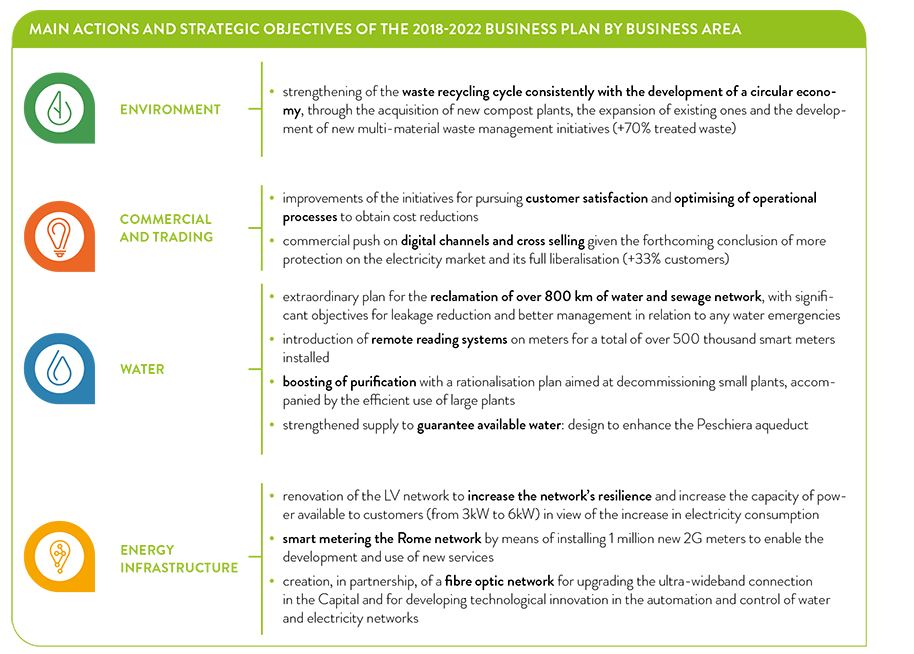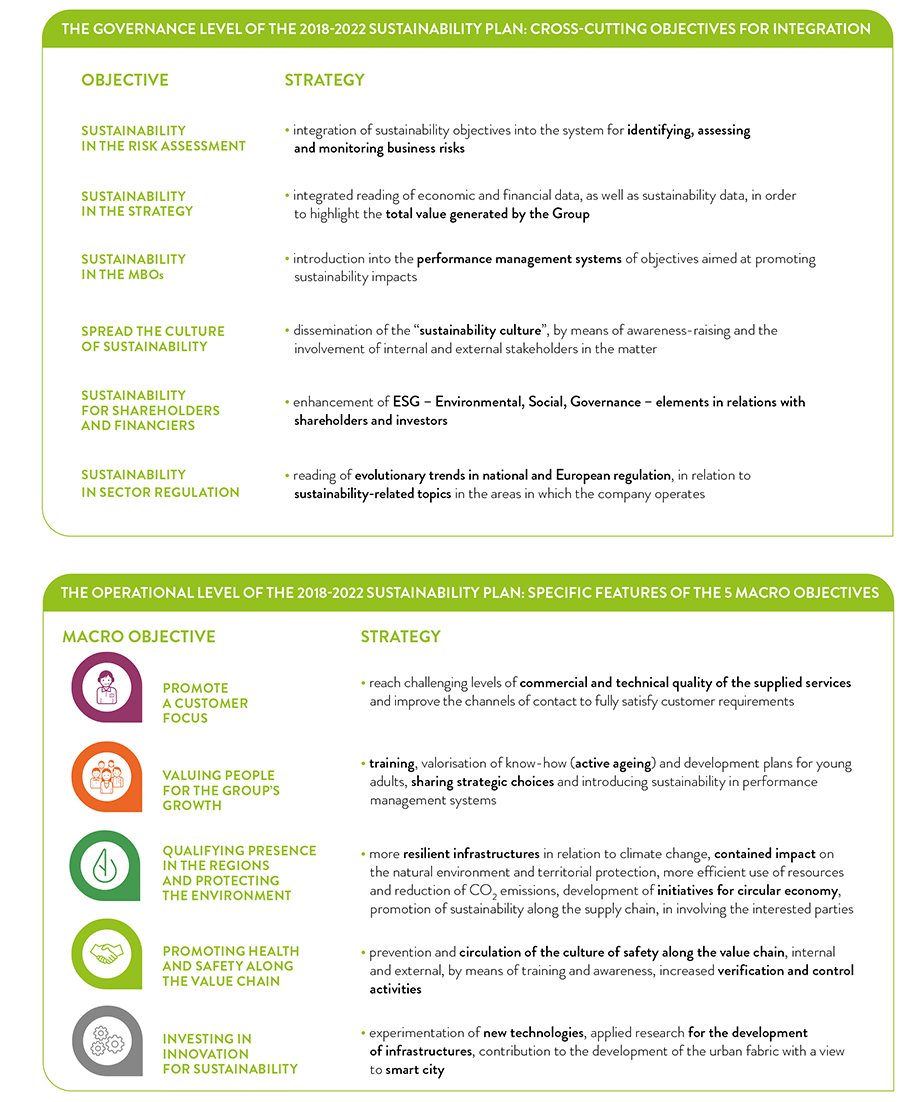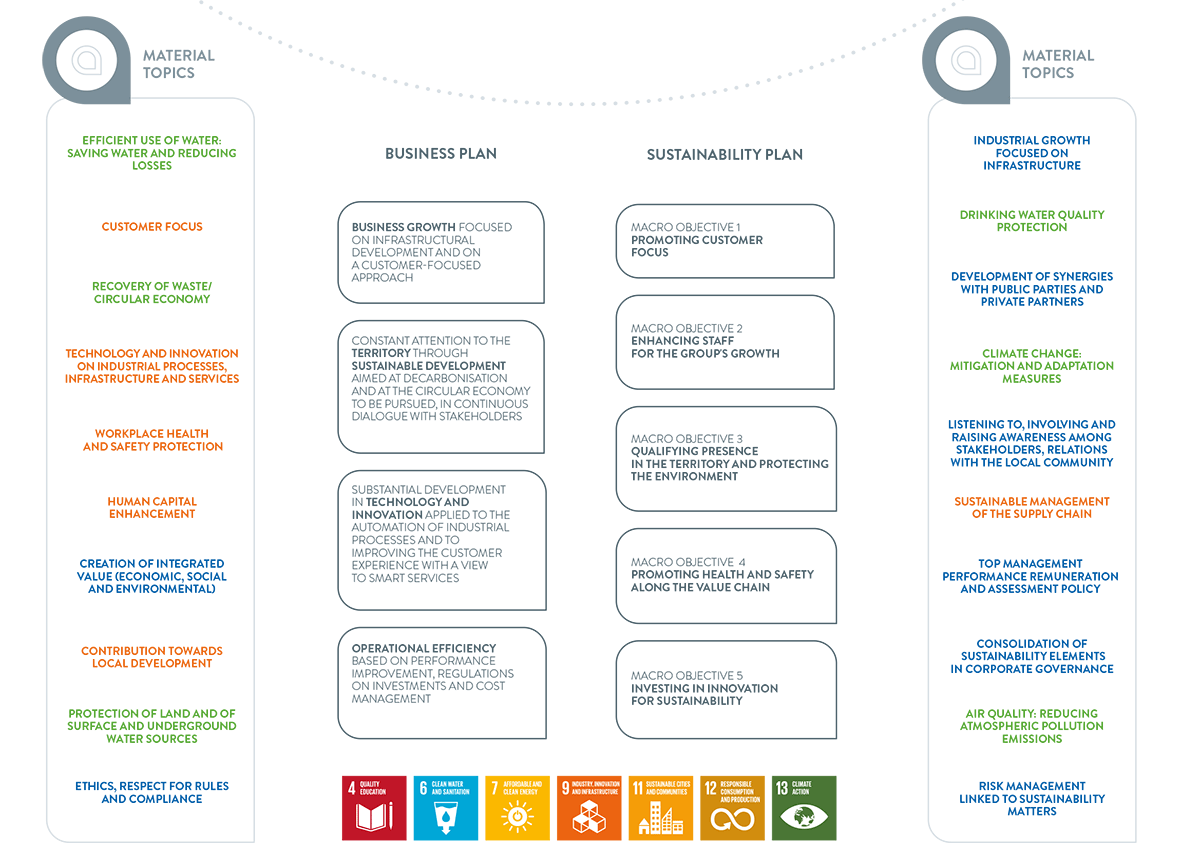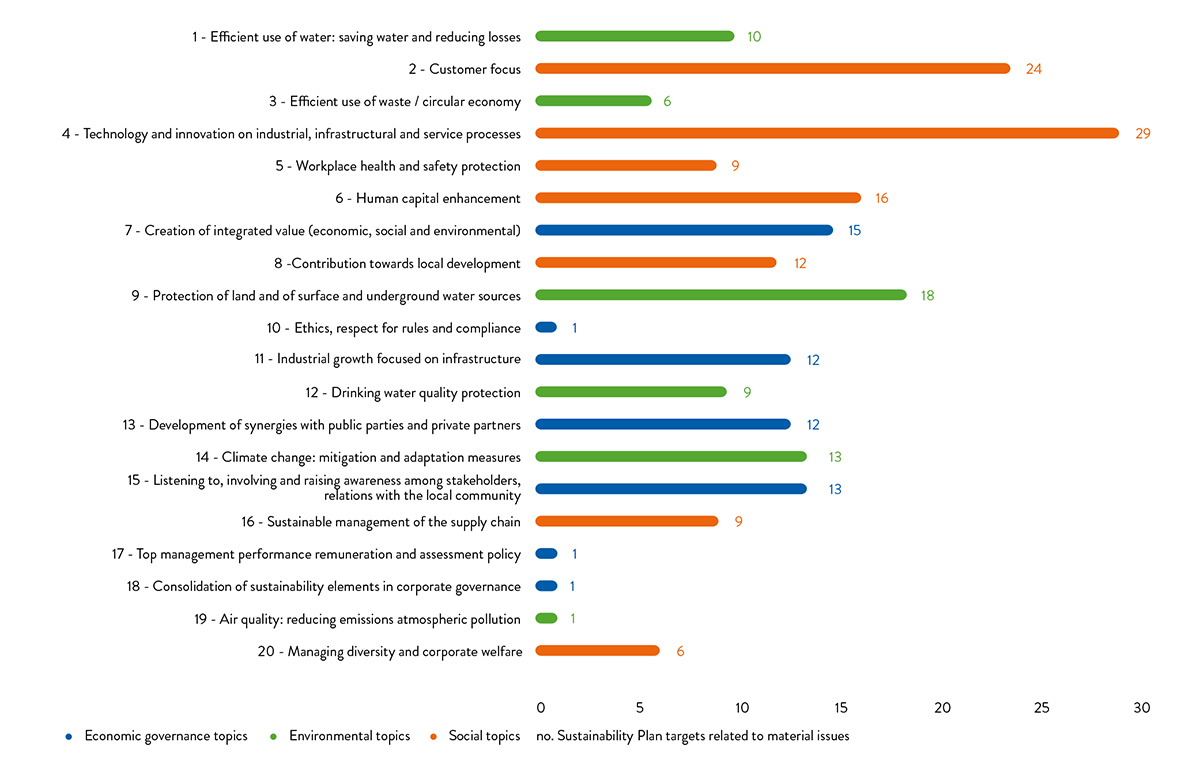Integrated strategy
Taking advantage of the opportunities offered by the evolution of the setting and the new economic, social and environmental challenges, Acea’s strategic planning balances both the industrial dimension and the sustainability aspects in its business objectives, thus facilitating “integrated thinking”.
In this perspective, during the year, the Sustainability Advisory Board (see the dedicated box) became fully operational, a Panel supporting the Chairman and the Chief Executive Officer, which has the task of facilitating integration and overseeing the implementation of the 2018-2022 Sustainability Plan, starting with the “governance level” objectives; the first seminars were held – conducted by experts and focused on specific targets – to examine some sustainability issues related to business and operational management and analyses were performed on sustainability risks generated and incurred (see the section Corporate governance in Acea, specifically Integrated risk analysis).
On the basis of the analysis of trends and the relevant context, the 2018-2022 Business Plan focuses on the following strategic pillars 18:
- Industrial growth focused in infrastructural development and a customer-oriented approach;
- Territory and sustainability, based on the decarbonisation of consumption through the development of electrification of energy uses, the recovery of waste in a perspective of circular economy and the protection of water management;
- Technology, innovation and quality, with investments of over € 400 million in innovative projects to facilitate the transition to advanced models of smart grids and smart cities;
- Operational efficiency, by means of the managerial regulation of costs and investments and improvement of performances.
The total investments envisaged in the Plan amount to € 3.1 billion.

18 - At the time of publication of the consolidated non-financial declaration, the business plan is being revised and updated.
The 2018-2022 Sustainability Plan, approved by the Board of Directors, was drawn up at the same time as the industrial plan with the broad and direct involvement of the Group’s management. This has made it possible to produce an overall vision of the company’s strategy and to highlight the correlation between the investments envisaged in the Industrial Plan and sustainability objectives, for a value of approximately € 1.3 billion. In 2018, the investments made in relation to the “targets” of the Sustainability Plan amounted to approximately € 175 million.
The 2018-2022 Sustainability Plan is made up of 6 cross-cutting objectives aimed at integrating sustainability into corporate governance (governance level) and 5 macro-objectives at an operational level, with targets for 2022 and related KPIs.

As can be seen from the guidelines expressed in the Group’s two strategic industrial and sustainability planning documents, many elements, already related in operational management, lend themselves to an integrated interpretation, which enhances the peculiarities and complementarity between the two Plans – one focused on aspects related to the economic solidity of industrial growth and the other on the expected results for stakeholders and from the social and environmental point of view – in the framework of Acea material issues and the relevant UN sustainable development goals (SDGs).
CHART NO. 8 - KEY ELEMENTS OF THE STRATEGY

During the year, the 2018-2022 Sustainability Plan was updated in light of developments in the company, particularly in the areas of health and safety, smart working and innovation. These updates led to the reformulation of 3 targets, the elimination of 5 no longer considered strategic and the introduction of 7 new targets.
Therefore the operational level of the 2018-2022 Sustainability Plan is currently divided into 137 targets.
In 2018, an initial monitoring of the Plan’s progress was carried out.
In particular, the evolution of the governance objectives for some of the Holding’s Departments/Functions with strategic roles was shared during meetings of the Sustainability Advisory Board.
The objectives of the operating level – expressed in targets for 2022 and KPIs – were the subject of precise monitoring, carried out in two stages of the second half of 2018, the results of which, for the first phase, were presented to the Sustainability Advisory Board. The monitoring made it possible to identify the actions implemented during the year. The analysis of the data collected showed that only 11% of the targets were neglected during the year, 78% of the sustainability targets were acted on in 2018 and 11% have planned actions.
In 2019, the Sustainability Plan may be further amended in order to incorporate new developments in the business strategies detailed in the Industrial Plan, which are currently being revised and updated, and in consideration of the presence of targets already achieved or no longer pursued by the Group.
The activities of the sustainability advisory board
During the year, the Sustainability Advisory Board, a panel responsible for providing support to the Acea Chairman and CEO, began its activities in order to supervise the implementation of the Sustainability Plan – with regard to both governance level guidelines and operational level objectives – and its periodic review.
The composition of the Board is established by the Board of Directors. It consists of the main Functions and Departments of the Holding Company, which also have responsibility for the governance level of sustainability. To date, the Functions/Departments involved are: External Relations and Communications; Internal Audit; Risk & Compliance; Administration, Finance and Control; Investor Relations; Human Capital Development; Innovation, Technology & Solution; Corporate Affairs and Services Department; Board of Directors’ Secretariat.
In 2018, the Board met three times, focusing in particular on the governance level and the first results of the progress of sustainability objectives at the operational level thanks to the implementation of a periodic monitoring process, sharing reflections on initiatives to promote the implementation of the Sustainability Plan.
In compliance with the tasks set out in its regulations, the Board also promoted and coordinated a calendar of seminars carried out by a qualified external organisation, examining topics of specific interest consistent with the strategic plan outlined in the Sustainability Plan, useful for further developing the integration of sustainability into the company’s management logic.
These seminars were attended by colleagues representing the Group Organisational Units/Companies pertinent to the subject under discussion. The topics were: Climate Change; Sustainability in business risk management; Performance management system and sustainability objectives.
Being a panel, the Board has also made a positive contribution to the sharing of knowledge and information among the various Functions, encouraging synergies and cross-cutting collaborations on sustainability projects and initiatives and the development of new corporate actions implemented to incorporate the targets of the Sustainability Plan.
Having monitored the progress of the 2018-2022 Sustainability Plan, to better represent the consistency between material issues and strategic sustainability planning the correlations between sustainability objectives for which actions were carried out during the year and material issues were highlighted (see Chart no. 9).
CHART NO. 9 - CORRELATION BETWEEN THE 2018-2022 SUSTAINABILITY PLAN AND MATERIAL ISSUES
